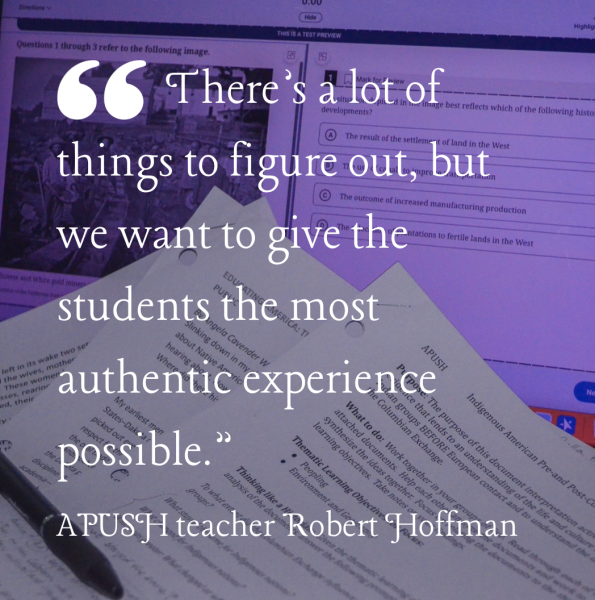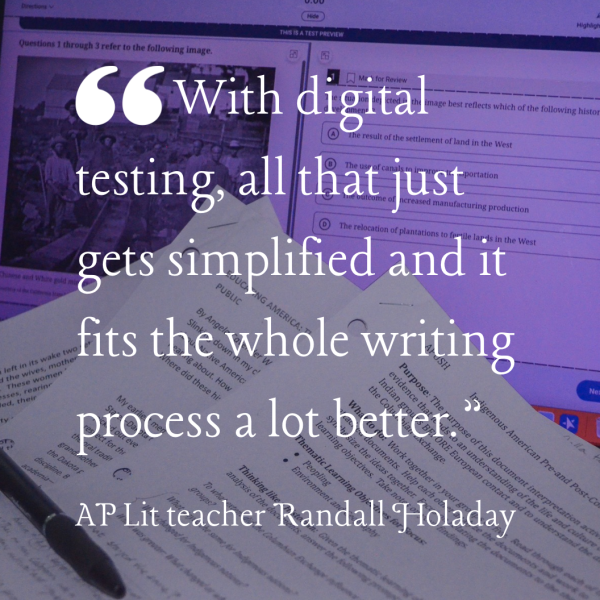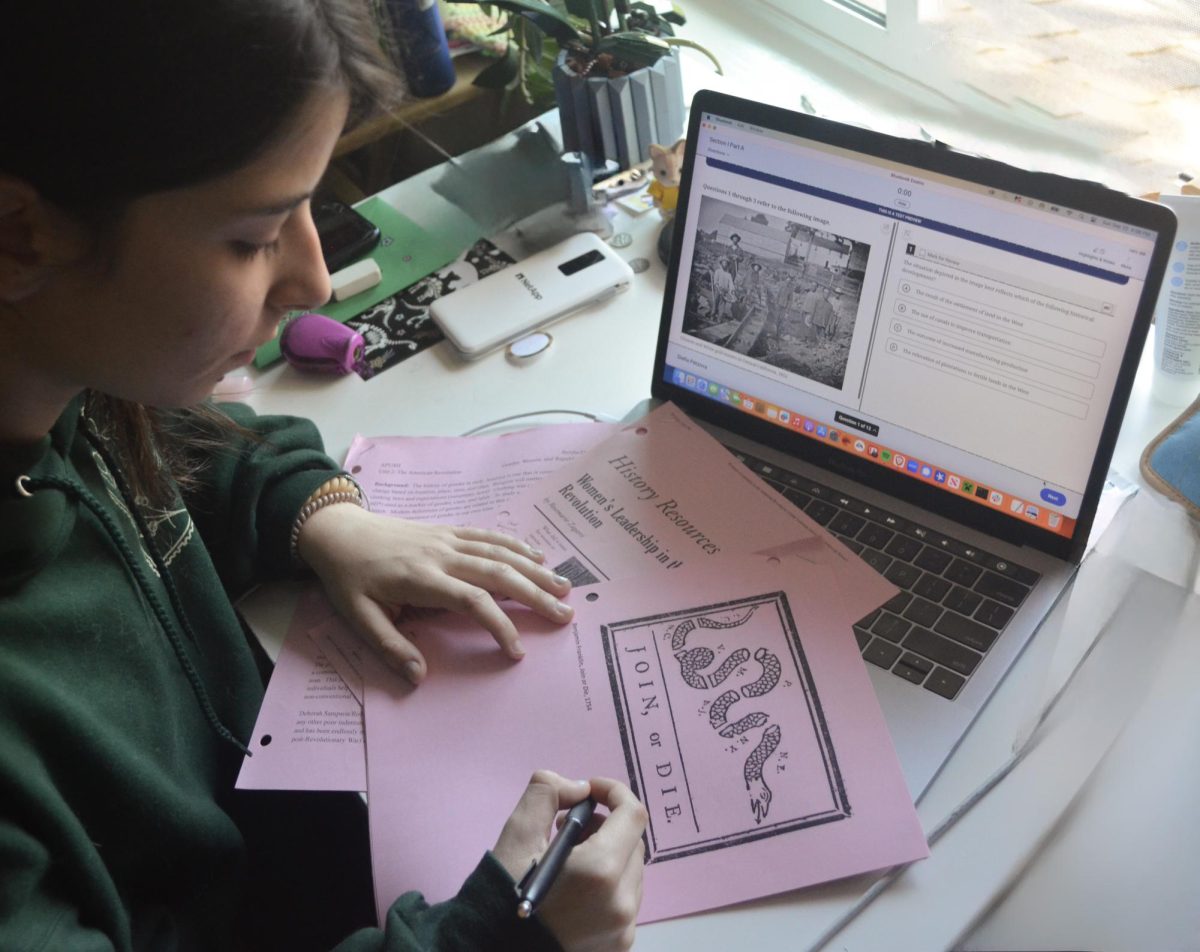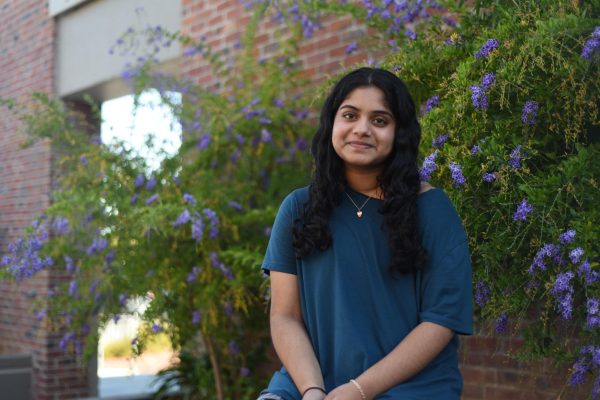Beginning in May 2025, 28 Advanced Placement Exams will transition away from paper testing. 16 Exams will be held fully digitally on the Bluebook testing application, along with 12 hybrid Exams, which will only have digital multiple-choice sections. According to College Board, the change was implemented to “ensure the continued security” of the Exams amid a rise in stolen AP Exam content.
FUHSD AP U.S. History teachers have previously held annual meetings on whether to use a digital or paper format on the AP Exam, with their choice always being to continue with paper testing to prevent cheating. However, the College Board decision has mandated digital testing regardless of teachers’ preferences. To AP U.S. History teacher Robert Hoffman, this change poses a challenge in how students will prepare for the Exam in class. For now, the class will continue with on-paper practices.
“I can’t even fathom or wrap my brain around how I would do document-based questions, long essay questions and short answer questions online every three or four weeks,” Hoffman said. “It would take a lot of time to put all the sources online in addition to transitioning into doing that. The biggest issue for us in class would be how to navigate it. Everyone should have their own personal device and Lockdown Browser. Then there’s the issue of AI. There’s a lot of things to figure out, but we want to give the students the most authentic experience possible.” 
Junior Elaine Chen, who is currently enrolled in AP U.S. History and plans to take the Exam in May, has previously taken the AP Computer Science A and AP Chinese Exams. She notes that the digital AP Chinese Exam faced technological challenges, like connectivity issues, while the test-taking experience of AP Computer Science A, which was a paper Exam but will transition to digital in 2025, went more smoothly. Junior Anika Ramachandran is currently enrolled in AP Biology and plans to take the Exam, which will use a hybrid format. The multiple-choice questions will be held digitally on Bluebook, and the free-response questions will be handwritten. Ramachandran shares Chen’s sentiment, citing potential logistical challenges as obstacles to a smooth testing experience.
“My initial reaction was, it must be really tedious,” Ramachandran said. “It just creates a lot more work for College Board because they have to vet all the devices, and things can go wrong. People all around the country, and probably outside of the country, are going to be taking the AP Biology Exam at the same exact time. With that many people, the server is bound to crash, which is just going to cause more issues.”
While Chen believes that the perceived downsides of a digital format outweigh the positives, Ramachandran agrees with the change regardless of the downsides. Ramachandran’s ideal AP Biology Exam would be fully digital rather than hybrid, ensuring that there is the ease of typing the free-response questions.
“I don’t really love the whole paper test taking process, especially with the free-response questions,” Ramachandran said. “My hand cramps up a lot, and it’s very hard to write, especially in pen, because you have a bunch of ideas going back and forth. Digital is a lot easier for typing and checking your answers. With a hybrid format, there’s a very hard switch that you have to make with your brain – to turn it off from the digital world and start writing is pretty hard.”
AP English Literature and Composition teacher Randall Holaday prefers the digital format for the AP English Literature Exam, which switched to digital last year. He doesn’t share Hoffman’s concerns about AI, as the Exam tests students’ skills at interpreting texts rather than memorization of facts, which could be easily done by AI. As a teacher, Holaday favors grading digital rather than handwritten essays during his class, stating that the digital format “saved his life” by eliminating difficult-to-decipher handwriting. In addition, he believes that students, who are often more comfortable typing rather than handwriting an essay, can write more in the given amount of time and edit their essays more readily.
“Writing is not linear — it’s recursive,” Holaday said. “So being able to edit and change things around is just part of the process. With handwriting, you would have to cross things out and there is always a risk of graders not understanding your work. With digital testing, all that just gets simplified and it fits the whole writing process a lot better.”
According to Ramachandran, the AP Biology teachers, Julie Choi and Pam Chow, have been integrating digital assignments into the course’s homework. While Choi, Chow and Holaday have made a seamless transition to digital homework and practice essays, according to Hoffman, he and his fellow AP U.S. History teacher Bonnie Belshe have not changed their in-class practices to reflect the new format, choosing to stay with pen and paper for now.
Aiming to integrate digital aspects in class as the year progresses, Hoffman and Belshe hope to start off by assigning online practice tests and assessments on the College Board website. Regardless of the challenges that transitioning poses, Hoffman believes that through collaborative effort, the Exam in May will go smoothly.
“It’s going to be a work in progress,” Hoffman said. “It’s going to be a trial and error kind of thing. We’ll see how it goes. But I don’t think it’s going to necessarily impact the students’ scores or anything like that. When we come to May, we’re hopeful that students, even by just practicing on pen and paper, can transition really easily to doing it online.”












